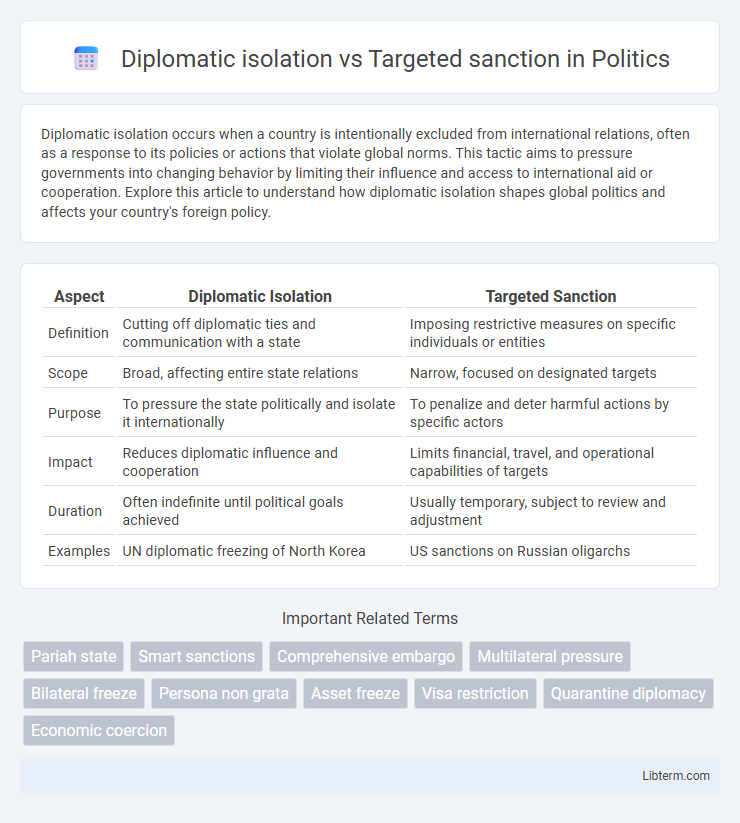Diplomatic isolation occurs when a country is intentionally excluded from international relations, often as a response to its policies or actions that violate global norms. This tactic aims to pressure governments into changing behavior by limiting their influence and access to international aid or cooperation. Explore this article to understand how diplomatic isolation shapes global politics and affects your country's foreign policy.
Table of Comparison
| Aspect | Diplomatic Isolation | Targeted Sanction |
|---|---|---|
| Definition | Cutting off diplomatic ties and communication with a state | Imposing restrictive measures on specific individuals or entities |
| Scope | Broad, affecting entire state relations | Narrow, focused on designated targets |
| Purpose | To pressure the state politically and isolate it internationally | To penalize and deter harmful actions by specific actors |
| Impact | Reduces diplomatic influence and cooperation | Limits financial, travel, and operational capabilities of targets |
| Duration | Often indefinite until political goals achieved | Usually temporary, subject to review and adjustment |
| Examples | UN diplomatic freezing of North Korea | US sanctions on Russian oligarchs |
Defining Diplomatic Isolation and Targeted Sanctions
Diplomatic isolation involves severing or limiting official diplomatic relations with a country to exert political pressure without direct conflict. Targeted sanctions focus on specific individuals, entities, or sectors, aiming to minimize broader economic impact while pressuring key actors. Both strategies serve as tools in international relations to influence behavior without resorting to military action.
Historical Contexts: Use in International Relations
Diplomatic isolation has historically been employed as a strategy to pressure states into changing policies by severing formal diplomatic ties, as seen during South Africa's apartheid era when global powers withheld diplomatic engagement to signal condemnation. Targeted sanctions emerged more prominently in the 1990s, focusing economic and political penalties on specific individuals or entities to minimize widespread humanitarian impacts, exemplified by sanctions against key Iranian officials related to nuclear proliferation concerns. Both tools have shaped international relations by providing mechanisms to influence state behavior without resorting to military intervention.
Key Objectives of Diplomatic Isolation
Diplomatic isolation aims to pressure a state by severing political and economic ties to diminish its influence and compel behavioral change without direct confrontation. This strategy seeks to weaken the targeted country's international standing, undermine its legitimacy, and restrict access to global decision-making forums. By isolating the regime diplomatically, the international community signals disapproval and aims to incentivize reforms or compliance with international norms.
Main Purposes of Targeted Sanctions
Targeted sanctions aim to pressure specific individuals, entities, or sectors responsible for objectionable actions without broadly harming the general population. They focus on restricting assets, travel, and financial transactions to isolate decision-makers and deter illegal or aggressive behavior. The primary goal is to change targeted behavior while minimizing collateral damage to the wider economy and civilian population.
Mechanisms of Implementation: Methods and Tools
Diplomatic isolation employs mechanisms such as withdrawal of ambassadors, suspension of diplomatic relations, and exclusion from international forums to exert political pressure and signal disapproval. Targeted sanctions utilize financial restrictions, asset freezes, travel bans, and trade embargoes aimed specifically at individuals, entities, or sectors to minimize broader economic impact while maximizing strategic effect. Both methods rely on international cooperation and legal frameworks to enforce compliance and enhance effectiveness in influencing state behavior.
Effects on Government Behavior and Policy Change
Diplomatic isolation often pressures governments by restricting international engagement and signaling broad disapproval, which can lead to internal policy reevaluation but may also prompt nationalist resistance or regime entrenchment. Targeted sanctions focus on specific individuals or entities, aiming to directly influence decision-makers by limiting their resources and mobility, thereby increasing the likelihood of behavioral change without widespread economic suffering. Empirical studies show targeted sanctions are more effective at inducing policy adjustments, while diplomatic isolation risks fostering government defiance or increased authoritarian control.
Humanitarian and Economic Impacts
Diplomatic isolation restricts a country's international engagement, limiting access to diplomatic channels and international aid, which can exacerbate humanitarian crises by reducing support and coordination in disaster relief and development programs. Targeted sanctions focus on specific sectors, individuals, or entities, aiming to minimize broad economic disruption while pressuring political elites, but they can still indirectly harm vulnerable populations by restricting financial flows and access to essential goods. Both approaches have significant economic impacts; diplomatic isolation often leads to decreased foreign investment and trade, while targeted sanctions disrupt key industries, potentially leading to inflation, unemployment, and reduced public services.
Case Studies: Successes and Failures
Diplomatic isolation often aims to pressure regimes by restricting their international engagement, exemplified by South Africa's apartheid-era ostracism, which contributed to policy changes, contrasting with North Korea where isolation failed to halt nuclear development. Targeted sanctions, such as those imposed on Iran's nuclear program, focused on specific sectors and individuals, achieving partial compliance yet facing criticism for unintended humanitarian impacts. The comparative effectiveness depends on strategic design, enforcement clarity, and the geopolitical context influencing state behavior.
International Law and Ethical Considerations
Diplomatic isolation involves severing or limiting official state-to-state communication and cooperation, raising questions under international law regarding the principles of sovereignty and non-intervention. Targeted sanctions, such as asset freezes and travel bans imposed on specific individuals or entities, aim to minimize humanitarian impact while complying with United Nations Security Council resolutions and customary international law. Ethical considerations focus on balancing state responsibility to uphold human rights and international peace against the potential harm to innocent civilians when broad measures are applied.
Future Trends in Global Diplomacy and Sanctions
Diplomatic isolation will increasingly be replaced by targeted sanctions focused on key political figures and economic sectors to maximize pressure while minimizing collateral damage. The use of digital surveillance and financial technology innovations will enhance enforcement and monitoring capabilities of sanctions regimes globally. Multilateral coordination through organizations like the UN and regional blocs will intensify to ensure synchronized responses and to prevent sanction evasion in future diplomatic strategies.
Diplomatic isolation Infographic

 libterm.com
libterm.com